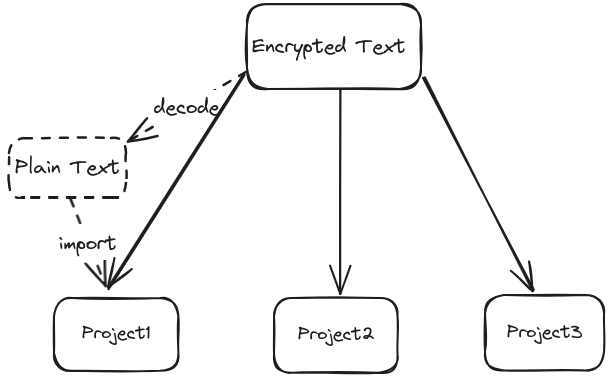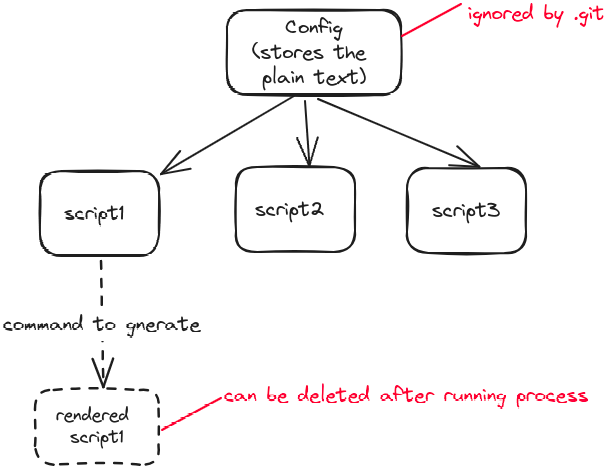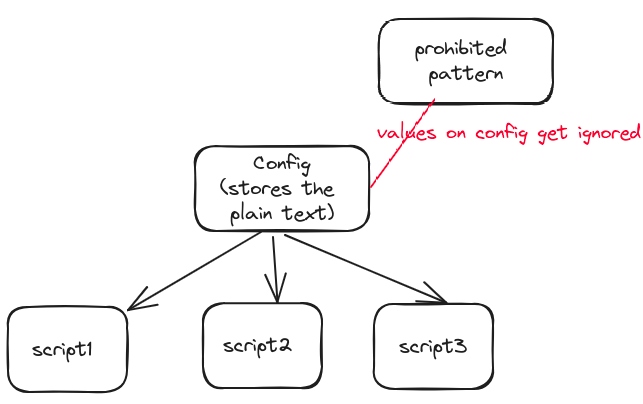Overview
I once mistakenly pushed AWS access keys to GitHub. To prevent this, I explored two methods to automatically exclude secret files from Git:
- Store secrets on PC as masked files. These are read, decoded, and imported into each project.
- Save secrets in the project. They get excluded by Git even if
.gitignoreis deleted.
Method1: Store Secrets on PC
This method prevents local secret leakage. It involves encoding or decoding secrets using RSA or similar. 
Advantages: Secrets are saved once locally and used across projects.
Disadvantages:
- Public and private keys must be maintained for encoding and decoding.
- Keys cannot be directly accessed until the file is decoded.
Due to these disadvantages, I abandoned this method.
Method2: Save Secrets in the Project
It would exclude a project’s env secret file from Git, apart from using .gitignore.
Git-Secret from Github
git-secret provides file access permission to certain users using an encoder-decoder method. However, it doesn’t automatically exclude files from .github.
Git Secrets from Another Github
This solution targets individual secrets, not the whole file. It involves storing plain secrets in a config file that is automatically ignored after initializing git secrets init.

- In scripts, when import values from config file, calling them with the following format in scripts:
DATABASE_HOST=
DATABASE_PORT=
DATABASE_NAME=
DATABASE_PASSWORD=
- Get scripts with plain secret values by rendering the config into it
git secrets add file <script1> -t <script1_plain_value>
git secrets render env
The rendered script (with plain value) would be the following:
DATABASE_HOST=database_value
DATABASE_PORT=database_port_value
DATABASE_NAME=dataname_value
DATABASE_PASSWORD=database_password_value
Generally, if we want to import value from config, have to run the git secrets add and git secrets render. Rendered scripts can be deleted any time and do rendering again if needs to run scripts.
- In addition, it provides a single command to scan, checking whether in any file file, it stores the secret value as the config keeps.
After trying this, it’s still troublesome every time I had to generate an rendered scripts. It may avoid the risk that the rendered scripts would be pushed into the github, since that single command can do the scanning.
Git Secrets from AWS Labs
git secrets from AWS Labs was the final solution I explored. It involves installing and running git secrets in .git, registering default AWS Accesskey format, adding custom prohibited patterns, and scanning the repo for these patterns.

Steps to Install in Linux
Requires Sudo Permission
git clone https://github.com/awslabs/git-secrets#nix-linux-macos
make install
Steps to Run
- Initialize
git secretsin.gitcd /path/to/my/repo git secrets --install - Add default
regexAWS Accesskey format, prohibiting to upload matched formats to cloudgit secrets --register-aws git secrets --register-aws --global Customize the prohibited pattern. For example
git secrets --add '[A-Z0-9]{20}- Scan the whole repo/folder/file to check whether it includes the prohibited pattern:
git secrets --scan {location}When committing, it automatically scans the whole repo.
Feedback
This solution is straightforward but could be improved with an auto-encoder to store plain values in a config file and an auto-decoder to import them into scripts.
